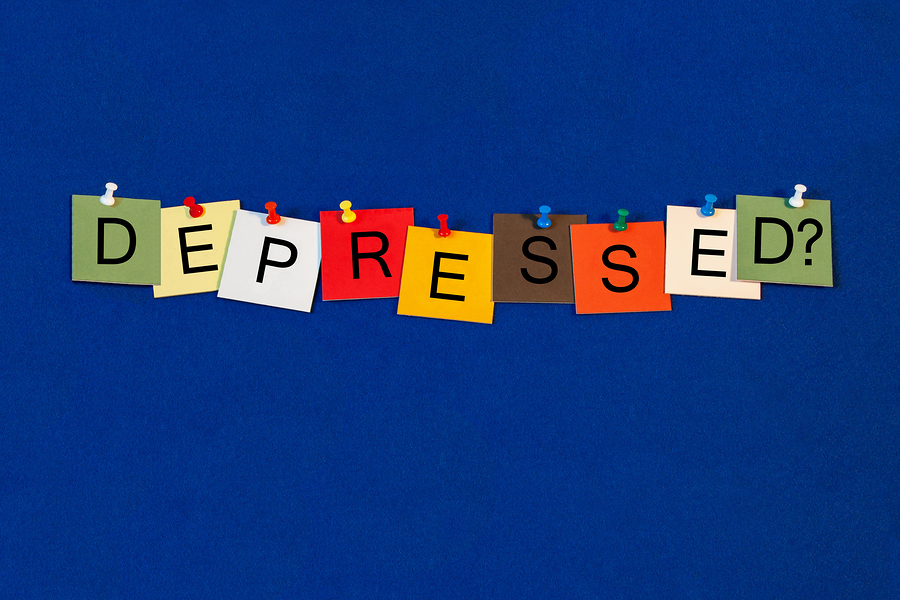Depression Help
Everyone occasionally feels sad or blue, but these feelings are usually short lived and pass within a few days. But when sadness is persistent and lasts for weeks it can be a sign that you are experiencing a more serious condition called depression.
Depression is the most common mental health disorder in the US and it impacted an estimated 16 million people last year. Although depression is a serious illness, I want you to know that there is depression help and you can get better with treatment even though it might feel impossible. (During the winter months you might also experience Seasonal Affective Disorder and you can read more about that here.)
The first step in treating depression is to identify which symptoms you’re experiencing. Keep in mind that signs of depression vary from person to person and that people usually experience several symptoms at a time. You also need to know that the severity, frequency and intensity of depression symptoms can vary by person.
Here is a list of the most common symptoms of depression:
- Persistent sad, anxious or “empty” feelings
- Feelings of hopelessness or pessimism
- Feelings of guilt, worthlessness or helplessness
- Irritability and restlessness
- Loss of interest in activities you once found pleasurable – including sex
- Fatigue and decreased energy
- Difficulty concentrating, remembering details and making decisions
- Insomnia, early-morning wakefulness or excessive sleeping
- Overeating or loss of appetite
- Aches or pains, headaches, cramps or digestive problems that do not ease even with treatment
- Thoughts of suicide or suicide attempts
If you’re experiencing any of these symptoms for more than 14 days it is important to get a professional diagnosis because starting treatment is the next step toward your recovery. Research has consistently shown that the best depression help is to treat it with medication and psychotherapy – often in combination.
However, if you’re depressed it can feel incredibly hard to take action and do anything to help you get better. The key is to start by taking small steps. I’ve helped hundreds of patients overcome depression and the key to feeling less depressed is to get help.
If you don’t know of a reputable psychologist or psychiatrist in your area you can ask your family physician for a recommendation. You can also find a list of mental health hotlines here. But if you’re thinking of harming yourself, you should call 911 or go to your local emergency room.
In addition to psychotherapy and medication, here are five things you can start doing today to feel better.
Connect and share how you feel.
Reach out to the people around you who care about you and tell them how you’re feeling. They won’t be able to “fix” your depression, but having their love and support will help you through this difficult time.
Also try to keep up with social activities even if you don’t feel like it. Sometimes doing the opposite of what you’re feeling can actually be helpful (you can read my post on opposite actions here).
Withdrawing is a hard-wired action urge that occurs when you’re feeling sadness, but being around people and staying active will help you feel less depressed.
Take care of your body.
- Be sure to get 8 hours of sleep each night—but don’t overdo it and sleep in until noon.
- Eat a healthy balanced diet and avoid dips in blood sugar, which can dramatically affect your overall mood. Eating small meals every four to five hours and limiting refined carbohydrates (like soda, fruit juice, white bread and pasta, and white rice) can help keep your blood sugar levels stable.
- Get exposure to sunlight every day and have your vitamin D levels checked. Most doctors recommend that you supplement with 2000 IU of vitamin D3 daily. However, if your levels are low it can actually take more than that to get your numbers back to normal.
- Do a daily relaxation exercise first thing in the morning and/or before you go to sleep. You can try mine here.
- Avoid mood-altering substances like alcohol and tobacco.
Get regular exercise.
Exercise is one of the most powerful ways to improve a depressed mood. In fact, several research studies have proven that it can be as effective as taking an antidepressant.
Exercising probably feels like the last thing in the world you want to do when you’re depressed, but you can start by making small changes. Take the stairs instead of the elevator or go for a 10-minute walk at lunch instead of looking at Facebook. Be consistent and I guarantee you’ll feel the positive effects.
Challenge your negative thinking.
Depression puts a negative filter on everything you see, think and do. It also impacts the way you view yourself, others and even the future. So it’s important to challenge your negative filters in order to start feeling better.
You can begin by keeping a journal of your negative thoughts. At the end of every entry challenge your thinking by asking, “If I wasn’t depressed right now would I still be thinking this way?” or “Could there be another way to look at this?”
You can read more about how to deal with eight of the most common patterns of distorted thinking here.
Try to do things you enjoy (or used to enjoy).
One of the hardest things to do when you’re depressed is to get motivated to do things that feel good. But it’s really important to try.
If you can’t think of anything that makes you feel good right now, try some of these ideas:
- Play with your pet.
- Watch a funny movie.
- Call a friend you haven’t spoken to lately—don’t text or email, call!
- Take a hot bath – with bubbles!
- Listen to music that makes you feel energized or happy (or that used to).
- Smile at the next child you see.
Depression robs you of energy, motivation and hopefulness, and this often makes it feel impossible to do the very things that you need to do to feel better. Overcoming depression is hard and it takes time, but it is possible.
The key is to start small, build up your effort day-by-day, and get help. And remember, you don’t have to do this alone!

